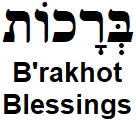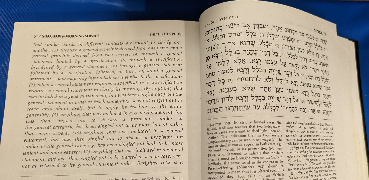Please note that this page contain the name of God.
If you print it out, please treat it with appropriate respect.If you do not have experience reading transliteration
please see the Guide to Transliteration.
As I write this page, COVID-19, the coronavirus, is sweeping across the world, and the need for this long-overdue page is more obvious than ever. Below are two common prayers for healing.
This blessing is part of the weekday Amidah, a prayer recited three times a day by observant Jews. This specific blessing is not recited on Shabbat or holidays because we do not make requests on such days, but it is a standard part of all other services.
This is not a prayer for the health of a single individual, but a communal prayer for the healing of all illness in the community. Mi Shebeirach, below, is a prayer for the healing of a specific person.
Mi Shebeirach is a standard prayer for healing recited by one person on behalf of another who is ill or injured. There are many different versions of this prayer. The version below is the one that is normally read in synagogue during the Torah reading between aliyot (portions of the reading), but it is appropriate to recite at any time there is a need.
When we ask G-d for a blessing or healing, it is customary to make a gift to charity, and the text below mentions that gift. It doesn't have to be a large gift: people in synagogue routinely put a dollar into the pushke (donation box) at the end of weekday services. If you put money in a jar around the house, it must be a jar intended for charity, not for household expenses or personal use! If you have no intention of making such a gift, you should skip the portion highlighted in yellow below that refers to the gift.
There are different versions below for men and for women. This is not a sexist thing. It is mostly because Hebrew requires many minor changes to express things in feminine or masculine form; it's more than just he/she and him/her, as you can see below. The only difference in the text is the reference to 248 and 365 body parts, which is a traditional understanding of the male body and adds up to 613, the number of commandments a man is obligated to follow. Women have different body structure and are exempt from some of the 613 commandments, so the numbers are removed in the part for women.
Note that when the name of the sick one is mentioned, it uses the mother's name instead of the father's name. The "mother's name" below is the mother's given name (first name), preferably the Hebrew given name if the mother has one but if she does not have one then you should use the name she uses instead of making one up. Likewise, the "patient's name" is also the given name, preferably the Hebrew given name but don't make one up. (The donor's name, on the other hand, is the full Hebrew name in the usual form, with the donor's father's name instead of the mother's because we are not seeking mercy for the donor. But again, if the donor does not have a Hebrew name, use the name the donor uses).
Why do we use the mother's name instead of the father's? Tradition teaches that the spiritual essence is passed through the mother, which is why traditionally Jewish identity passes through the mother. Also, in a practical sense, the identity of the mother is certain while the identity of the father is not always, as modern DNA testing sometimes shows, and we want to identify the exact right person. For me, it always makes me think of Jeremiah 31:15, the image of Rachel weeping for her children, and seeking mercy through a weeping mother.
 Common Prayers and Blessings
Common Prayers and Blessings Prayers and Blessings
Prayers and Blessings Jewish Liturgy
Jewish Liturgy